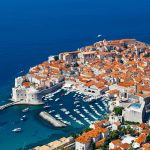ZAGREB, August 3, 2019 – The European Maritime Safety Agency (EMSA), whose primary task is to prevent accidents and pollution at sea, will strengthen safety and protection in the Adriatic Sea, its executive director Maja Markovčić Kostelac told Hina in an interview.
As summer is nearing its zenith and thousands of tourists are disembarking on the Croatian cost, EMSA is closely monitoring the situation in the Adriatic Sea.
“We have 17 ships deployed in different areas of Europe to help countries in clean-up operations in the event of pollution. In addition, we have provided countries with anti-pollution equipment such as barriers and dispersants, and we have also been using drones as of late,” Markovčić Kostelac said.
A former state secretary at the Croatian Ministry of the Sea, Transport and Infrastructure, she was elected EMSA Executive Director in January, becoming the first Croatian official at the organisation’s helm.
“My first task is to put in place a new EMSA development strategy for the next five-year period. That’s what I’m working on,” Markovčić Kostelac said in her office in Lisbon.
EMSA was established in 2002 after a maritime accident of the Prestige tanker which caused massive pollution of Spain’s northern coast. In 1999, the Erika tanker sunk and polluted the coast of France.
“Prevention is now at the highest level. There are fewer accidents and pollution incidents in the European seas,” Markovčić Kostelac said and added: “This is the result of the work of all member states, and with EMSA’s support a synergy has been achieved in the most critical and expensive operations.”
In January this year, 250 containers with chemicals fell off a ship off the coast of the Netherlands, and the most recent major accident occurred in the Bay of Biscay in March when the Grande America tanker sank in French waters, where hazardous substances are still leaking slightly.
Markovčić Kostelac said that southern European countries, including Croatia, were less equipped than northern countries, which was why EMSA was deploying more of its resources to the south.
“Major oil pollution in a sea such as the Adriatic, considering what a clean sea means for economic activity, would be a disaster,” the EMSA chief said.
Traffic is increasing in the Adriatic Sea, which is positive for the ports and economic growth, but at the same time it increases the risk of accidents, she noted.
“Croatia relies a lot on EMSA’s assistance in ships and equipment, which is why the agency has advertised a new tender for a ship that will be on stand-by somewhere in the Adriatic,” she said.
Such a vessel with the necessary clean-up equipment was docked in Trieste and was used in an exercise off the southern Croatian coastal city of Split in May 2018, involving Croatia, Slovenia and Montenegro. The agreement with that ship has been terminated for economic reasons on the owner’s part.
Markovčić Kostelac said that the tender for a new ship could be concluded before the end of the year, after which a new exercise would be held in the Adriatic. She said that countries organise exercises and EMSA helps them with equipment.
EMSA has entrusted Croatia with safekeeping rapid-response equipment in the event of sea pollution, which is worth nearly €1 million, and the agency’s drones are currently flying from Brač island to monitor vessel traffic. The value of this service is €1.5 million. “This will further strengthen safety in the Adriatic,” Markovčić Kostelac underscored.
She said that Croatia has some systems of service digitisation that even more developed European countries do not have. “More than 75 percent of maritime services in Croatia are offered digitally, so the EU can learn a lot from Croatia’s experience. Of course, we can learn a lot from others as well.”
She also noted that Croatia, along with Italy and Poland, has the largest number of seafarers in proportion to population size. Of the 4 million people in Croatia, nearly 20,000 are seafarers.
“This gives Croatia the right to encourage talks about the social agenda and have its voice heard,” Markovčić Kostelac said.
Prevention of pollution at sea is not EMSA’s only task. It also gathers information from different sources, such as ships, satellites and drones, processes it and disseminates it to European institutions, including Frontex, member states and their national authorities.
Markovčić Kostelac said that during her five-year term she wanted to strengthen the agency’s centre for operations through which information is exchanged and to strengthen the alliance with industry to apply the highest standards to those who live off the sea.
More news about the Adriatic Sea can be found in the Lifestyle section.








